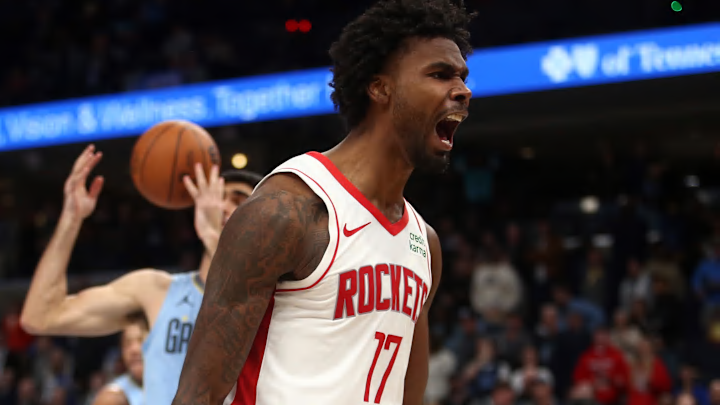The Houston Rockets trading Cam Whitmore to the Washington Wizards is just the latest in a long line of tough exits the team will facilitate in the near future. And Tari Eason could be the next player on the chopping block.
Jalen Green (and technically the No. 10 pick) was the first to go, a necessary consequence of Houston fast-tracking its timeline, and acquiring Kevin Durant. Now Whitmore finds himself on the outskirts, after getting buried in a wing rotation last season that’s only getting deeper with the addition of Dorian Finney-Smith.
Eason does not find himself in the same situation as either player. Green’s salary became high enough in his new extension that he needed to go in order for the Rockets to match Durant’s money. And unlike Whitmore, Eason isn’t in danger of getting lost in the 2025-26 season’s shuffle. His defensive intensity and malleability remain critical to Houston’s larger identity.
Yet, the Rockets are getting more expensive. That’s not going to change. Collateral damage is already taking shape, and a couple of recent decisions by the team suggest that Eason could be the next player to go.
Houston may not be able to afford Tari Eason moving forward
The 24-year-old defensive superhero is extension eligible this summer—just like Jabari Smith Jr. The thing is, the latter already signed his new deal. Smith agreed to a five-year, $122 million extension that has the potential to age into a bargain, but still takes up enough of the salary cap (12 to 13 percent) to make things tight when factoring in other paydays.
Alperen Sengun is set to begin a five-year, $185 million extension this coming season. Durant is up for a new deal himself, and if the Rockets max him out for 2026-27, he’ll be on the books for $57.9 million.
Assuming Fred VanVleet exercises his $26 million player option for that season, Houston will have close to $197 million committed to nine players. That is before adding in any draft picks, Eason’s next salary, and the required minimum-contract charges to bring the roster to 14 players. With the salary cap projected to come in around $165 million, the Rockets would be inside $3 million of the luxury tax. And again, this is without Eason’s salary.
Houston can, of course, just pay the tax. Especially if it winds up ducking it for this coming season. But paying the tax starts the dreaded repeater clock, bringing the Rockets closer to facing even harsher penalties. Beyond that, even if they are fine making it work through next season, it won’t stay that way.
If Tari Eason stays, another player will go
Amen Thompson is extension eligible next summer. Reed Sheppard will follow suit in 2027, and could prove expensive after tracking toward a bigger role this coming season. Even as older players like Durant and VanVleet age out, the Rockets won’t be able to keep the younger-player band together for much longer.
Eason doesn’t have to be the odd man out. Sheppard is more of a question mark. He also has the potential to fill a greater need for the Rockets. Thompson isn’t going anywhere. It’s tough to imagine Sengun getting shipped out when he’s among Houston’s few offensive creators. Smith previously looked like he could be the one to go, but his extension pretty much ensures he won’t be jettisoned before next summer.
Perhaps that is the Rockets’ endgame: figure it all out next offseason. If Giannis Antetokounmpo becomes available and Houston remains interested, any bigger salary is on the table–not just Smith or Sengun, but Durant and VanVleet, too.
Ultimately, the fate of Eason’s extension eligibility will speak volumes. If he agrees to one, he’s likely staying put through 2025-26. If he doesn’t, it could signal that the Rockets are open to making more tough calls before next summer.
